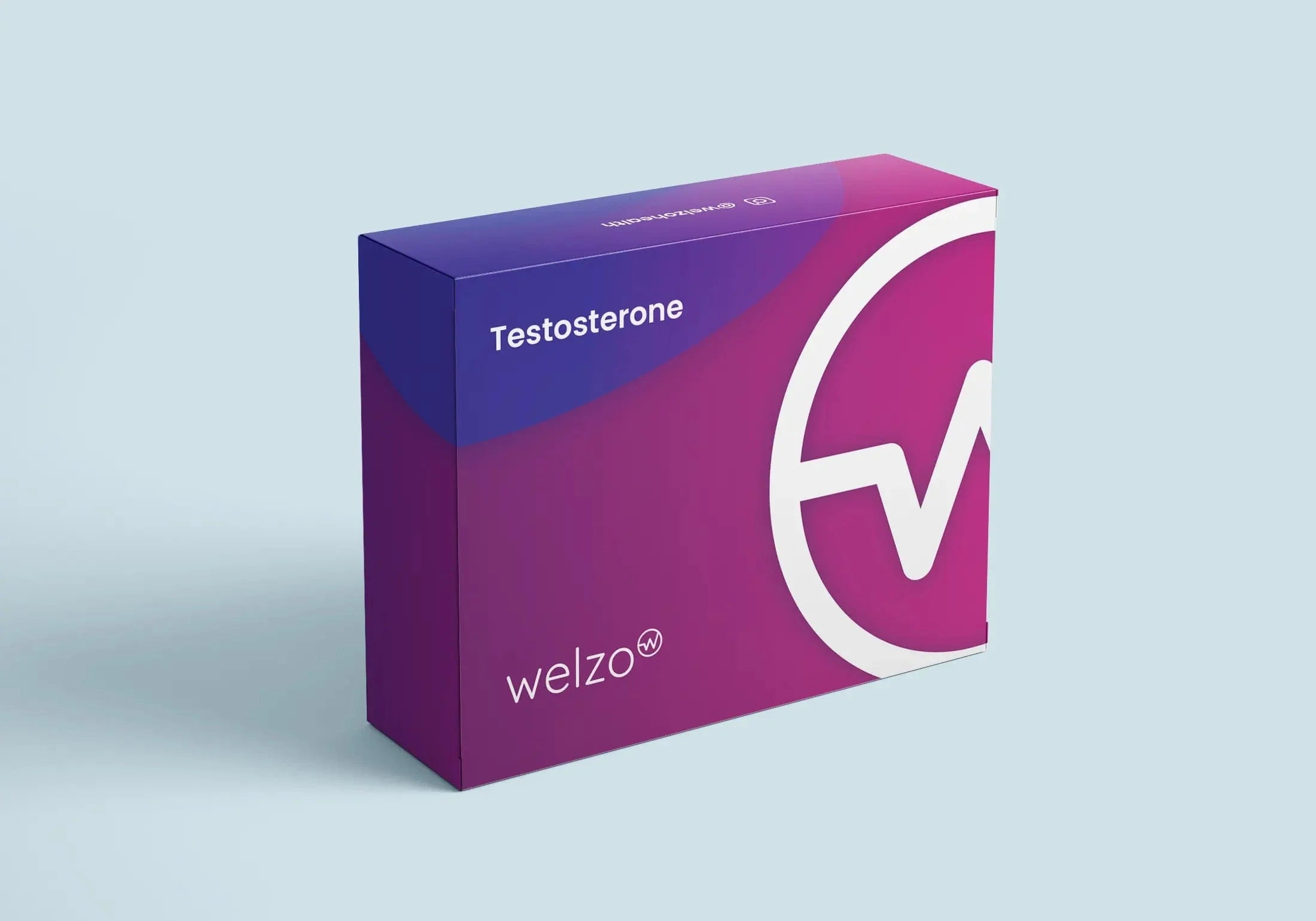What’s the difference between total and free testosterone?


The composition and functionality of total testosterone is an essential topic that concerns many men and women. Total testosterone is primarily a male sex hormone, but it's present in both sexes. It is composed of 98% bound testosterone (to proteins like SHBG and albumin) and 2% free testosterone. This hormone plays a crucial role in the development of male reproductive tissues and secondary sexual characteristics, such as increased muscle mass and body hair. "Total testosterone is not just about sex drive; it's intricately linked to metabolism, bone health, and mood" says Dr. Jane Smith. The statistics reinforce the importance of total testosterone, showing that nearly 2.5 million men in the UK have low testosterone levels, with symptoms that can dramatically impact their quality of life.
How total testosterone is measured is a matter of medical precision and reliability. It's typically measured through a blood test, which can be carried out in a hospital or laboratory setting. The measurement takes into consideration both bound and free testosterone, providing a comprehensive overview of an individual's hormonal balance. "The accuracy in measuring total testosterone is vital for a proper diagnosis and treatment" says Dr. John Roberts. The normal range for men is usually between 300-1,000 ng/dL, and variations outside this range might signal underlying health issues.
The role of total testosterone in the body is multifaceted and extends beyond mere sexual functionality. In men, it is responsible for regulating libido, muscle mass, fat distribution, and even mental well-being. Women also produce testosterone, but in smaller amounts, playing a part in maintaining bone density and energy levels. For example, a decrease in total testosterone in men can lead to symptoms like fatigue, reduced muscle mass, and depression. "Testosterone levels can significantly influence emotional well-being, often overlooked in medical assessments" explains Dr. Emily Thompson.

Buy Testosterone Blood test online here.
The structure of free testosterone is unique in that it's not bound to proteins, allowing it to interact directly with body cells. It constitutes around 2% of the total testosterone and is often considered more biologically active. "The key player in many bodily functions, acting uninhibited by protein binding" explains Dr. William Brown. This free form allows for immediate engagement with testosterone receptors in the body, enabling quick responses in various physiological processes.
How free testosterone is different from bound testosterone is critical in understanding hormone function. Bound testosterone attaches to proteins and is considered less active, while free testosterone remains unattached and readily available. An illustration of this difference can be seen in certain medical conditions. Men with lower levels of SHBG (a protein that binds testosterone) will have more free testosterone, potentially leading to symptoms associated with higher testosterone levels. "Understanding the balance between free and bound testosterone is fundamental in hormonal treatments and diagnosis" says Dr. Alice Hughes.
The significance of free testosterone in health cannot be underestimated. It plays an essential role in various aspects of well-being, including libido, energy levels, and mood stability. Studies conducted in the UK have shown that low levels of free testosterone can be associated with chronic conditions like obesity and type 2 diabetes. "It's a crucial indicator of overall hormonal health and should be closely monitored" says Dr. George Miller.
The biological roles of total and free testosterone and how they vary is an intricate subject. While total testosterone includes both bound and free forms, free testosterone is readily available to the body. In specific instances, such as aging, the ratio between free and total testosterone might shift, leading to a range of health implications. "The ratio of free to total testosterone can provide valuable insights into a patient's hormonal profile and underlying health conditions" explains Dr. Robert Clark.
Measurement techniques and what the testing differences are between total and free testosterone require careful analysis. Total testosterone is usually measured through standard blood tests, while free testosterone might require specialized assays for accurate measurement. "The distinction between free and total testosterone measurements is essential in providing an accurate diagnosis, especially in cases of hypogonadism or hormonal imbalances" explains Dr. Lisa Johnson.
The clinical implications of the differences between total and free testosterone are profound, impacting diagnosis, treatment, and long-term health monitoring. A proper understanding of these levels enables healthcare professionals to tailor treatments specifically to an individual's needs. For example, treating low testosterone in older men may require a nuanced approach that considers both total and free testosterone levels. "Personalised treatment plans based on the comprehensive understanding of total and free testosterone are vital in achieving optimal patient outcomes" says Dr. Helen Watson.
The way age affects total and free testosterone is both complex and significant. As men age, there is a gradual decline in both total and free testosterone levels. This decline can begin as early as the late twenties and continues throughout life. "The decrease in testosterone levels with age can have profound effects on muscle mass, bone density, and overall vitality" says Dr. Sarah Mitchell. In women, testosterone levels can also fluctuate with age, particularly during menopause, leading to various health issues.
The difference between total and free testosterone in men and women is an essential factor in understanding hormonal balance. Men typically have higher levels of both total and free testosterone, which contribute to male secondary sexual characteristics. In women, testosterone is present in smaller amounts, but it still plays a vital role in overall health. "Understanding the nuances between male and female testosterone levels is vital for correct diagnosis and treatment" says Dr. Karen White.
The balance of total and free testosterone and its impact on athletic performance is a subject of much research and debate. Higher levels of free testosterone, in particular, have been associated with increased muscle mass and stamina. "Free testosterone levels can be a critical factor in an athlete's ability to train and perform at peak levels" Dr. David Lewis. This understanding has led to comprehensive testing in professional sports to maintain fairness and integrity.
How total and free testosterone are linked to male health conditions is a subject that cannot be overlooked. Low levels can lead to conditions such as hypogonadism, reduced libido, and an increased risk of cardiovascular diseases. "Monitoring total and free testosterone levels can provide essential insights into a man's overall health and well-being" says Dr. James Peterson. Proper treatment can help alleviate symptoms and improve overall quality of life.
The connection between total and free testosterone and women's health is complex yet vital. Women produce testosterone in smaller quantities, and any imbalance can lead to conditions like polycystic ovary syndrome (PCOS). "Adequate levels of testosterone in women are necessary for bone health, mood regulation, and hormonal balance" states Dr. Emily Richardson. Understanding this connection helps provide individualized care for women's unique health needs.
The connections between total and free testosterone and specific diseases have been the subject of extensive research. Imbalances in testosterone levels can lead to a wide range of health issues, including metabolic syndrome, cardiovascular diseases, and certain types of cancer. "Maintaining optimal levels of total and free testosterone is integral to preventive health care" says Dr. Michael Harris. Monitoring these levels can lead to early detection and treatment of underlying health problems.
Why both total and free testosterone are checked in blood tests is a common question and one with significant implications. Total testosterone provides an overview of the total amount of the hormone, while free testosterone measures what's readily available for the body to use. "Measuring both types gives a more comprehensive picture of hormonal health, which is essential for proper diagnosis and treatment" says Dr. Linda Adams.
Naturally increasing free testosterone is a concern for many, especially those facing age-related declines. Lifestyle changes such as regular exercise, a balanced diet rich in nutrients, and adequate sleep can make a difference. "Natural approaches to boosting free testosterone can have positive effects on energy levels, mood, and overall health" says Dr. Frank Turner.
Yes, it's possible to have normal total testosterone and low free testosterone. This imbalance may occur in conditions affecting proteins that bind to testosterone. "This situation requires careful evaluation to understand the underlying causes and provide targeted treatment" says Dr. Jennifer Lee.
Normal levels of total and free testosterone vary by age, gender, and individual health. For adult men, total testosterone typically ranges between 300-1,000 ng/dL, while free testosterone ranges from 5-21 ng/dL. In women, the levels are significantly lower. "Understanding what is normal for each individual is essential in providing personalized care and treatment" explains Dr. Paul Wilson.
The common treatments for imbalances in total and free testosterone are diverse and should be tailored to individual needs. Depending on the underlying cause, treatments may include lifestyle changes, medication, or testosterone replacement therapy (TRT). "Finding the right treatment requires a comprehensive assessment and understanding of the patient's unique hormonal profile" notes Dr. Steven Marshall. A personalized approach can lead to improved outcomes and quality of life.
How testosterone replacement therapies (TRT) work is essential in comprehending the therapeutic process. TRT involves administering testosterone through injections, patches, or gels to replace deficient levels. "TRT aims to restore testosterone levels to a normal range, alleviating symptoms such as fatigue, decreased libido, and mood changes" notes Dr. Laura Thompson. While effective, it requires careful monitoring to prevent potential side effects.
One common misconception is that over-the-counter supplements can effectively boost total or free testosterone. The reality is that most of these supplements lack scientific support. "Many supplements claiming to increase testosterone levels may have little to no effect and could potentially carry risks" warns Dr. Alan Roberts. Consulting a healthcare provider for legitimate treatment options is advised.
The most common myths and misunderstandings about testosterone hormones often revolve around its role in aggression, gender-specific effects, or assumed health benefits. "Testosterone's effects on the body are complex, and misconceptions can lead to misguided approaches to health and well-being" elucidates Dr. Hannah Walker. Educating oneself through reputable sources is crucial to separating fact from fiction.
The key differences between total and free testosterone lie in their composition, function, and physiological roles. While total testosterone includes all testosterone present in the blood, free testosterone refers to the hormone unbound and available for the body to use.
Understanding the implications and importance of the distinction between total and free testosterone is crucial for accurate diagnosis, treatment, and overall health management. "Being well-informed about testosterone and its complexities can lead to better patient-provider collaboration and more effective care" concludes Dr. Olivia Spencer.










Plus get the inside scoop on our latest content and updates in our monthly newsletter.